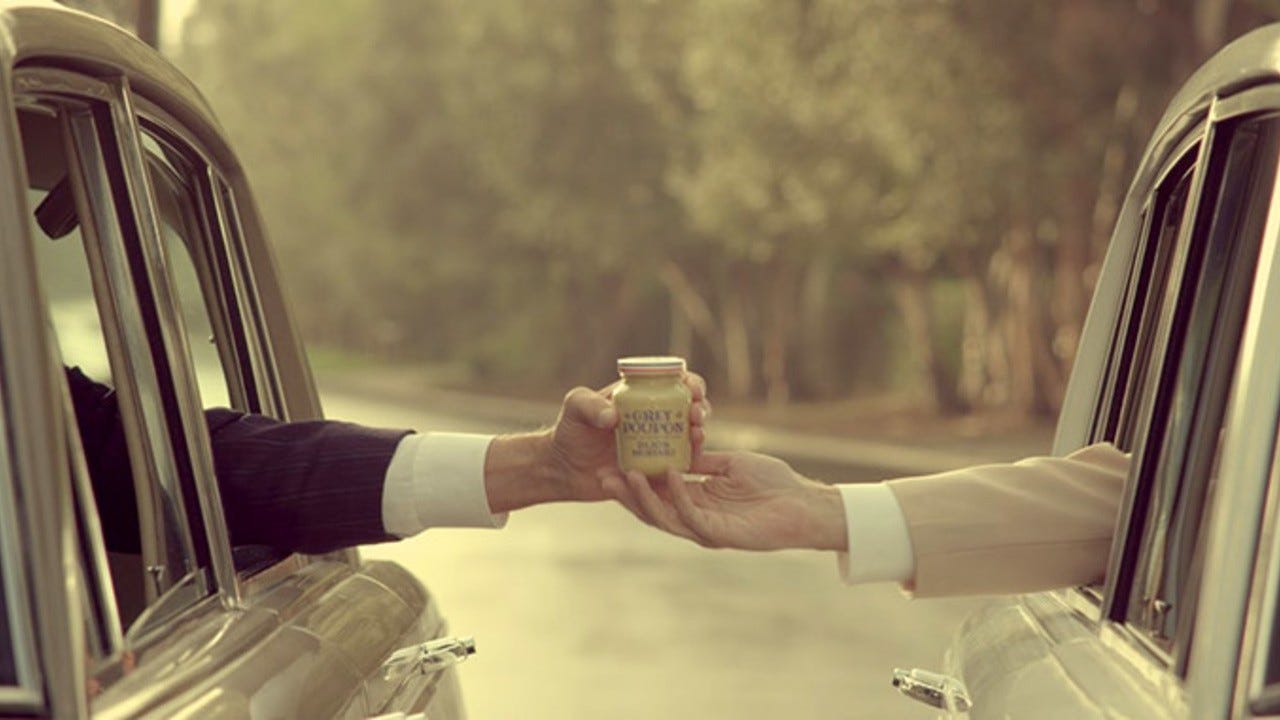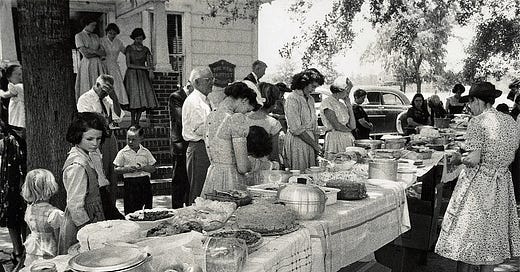From Potluck to Bloodbath
The short road from BYOB to RIP(Matthew 22)-Grace is the stumbling block
We often talk about surprising and unexpected Grace, about the love of God reaching those that we think that it can’t or shouldn’t, but our story today from the end of Matthew 22 begins in a very different but no less surprising way. It begins with surprising sin, inconceivable stupidity, and stubborn rejection of God when it seems most unlikely.
22 And Jesus answered and spoke to them again by parables and said: 2 “The kingdom of heaven is like a certain king who arranged a marriage for his son, 3 and sent out his servants to call those who were invited to the wedding; and they were not willing to come. Matthew 22
Now, full disclosure, I have never been to a royal banquet. I have never sat in a palace with foie gras on my Walmart t-shirt. I’ve never asked the butler for Grey Poupon. It’s not that I couldn’t or wouldn’t. I just haven’t had the opportunity. If I was invited I think that I would go. I’d go for the food. I could stare and gawk at my betters in my best country bumpkin style.

So, the people in our story declined to celebrate the royal wedding. I read it and wonder, ‘Who turns down free food?’ Was their beef with parties in general or this king in particular? Were they too good for the wine, maybe preferring grape juice, or afraid of their own unworthiness, afraid of making a fool of themselves like I am so often1? Either way it all comes out the same. Whatever else we see or say about this parable, I think that the real meat is in the shocking refusal of the invitation. We imagine ourselves as people who want to be happy and imagine the world, nature, and Nature’s God standing in our way. This parable denies both the credit that we give ourselves and the slander that we cast on God and Creation. Our flattering image of ourselves as lovers of joy and goodness and peace who just can’t achieve our goals must be rejected. Christ paints us as lovers of death and misery. When given the opportunity for something better, we stubbornly cling to our ways and our works.
Lotto winners usually declare bankruptcy within 5 years. They live it up and then find themselves back where they started. Winning the lottery doesn’t really change anything. It’s not so much a new life as a vacation, which is probably why we find it so desirable. We live our lives thinking that there is some amount of money great enough that it would change our lives forever, but this parable tells us that if that sort of gift was really offered to us that we would turn it down. We want transformation but we want the person that we are now to direct and control and if necessary veto the transformation. When the gift that will truly change everything arrives we refuse because it is an earthquake in our lives destroying everything that has come before. But let’s not get ahead of our story. The King is about to go farther than a simple invitation, much farther. And the invited guests are going to go farther than a respectful and apologetic rejection letter, much farther.
4 Again, he sent out other servants, saying, ‘Tell those who are invited, “See, I have prepared my dinner; my oxen and fatted cattle are killed, and all things are ready. Come to the wedding.” ’ 5 But they made light of it and went their ways, one to his own farm, another to his business.
When the time is approaching and it begins to seem as if the invited guests aren’t coming another more urgent and emphatic invitation is sent out. The host makes clear that He is providing everything. This isn’t a potluck. Mama doesn’t need to make chicken and dressing. Granny doesn’t need to bring a casserole. The party is definitely not BYOB. Ironically, this is probably the news that finalizes their decision to reject the invitation.

I should point out here that this isn’t a mixed response. There is no indication that any of the invited guests were willing to come. The guests, every man, woman, boy, and girl prefer their work to His party. He says so as baldly as words permit.
6 And the rest seized his servants, treated them spitefully, and killed them. 7 But when the king heard about it, he was furious. And he sent out his armies, destroyed those murderers, and burned up their city. 8 Then he said to his servants, ‘The wedding is ready, but those who were invited were not worthy.
That sure escalated fast.2 These people are invited to a party and feel the need to quite literally shoot the messengers. I struggled to see why a message that should be so welcome should provoke such a response. I think that it must be because although this is a very gracious invitation, it is a royal command. The Message is not, ‘You may come to the wedding.’ or ‘You are welcome at the wedding.’ but the imperative ‘Come to the wedding.’ We are offended at the invitation, offended that the host has prepared everything and demands that we bring nothing. Our offerings, our religion and our works are not optional and unnecessary, but rather they are forbidden. All of our contributions are excluded as things tainted and abhominable. This is why we are offended at the gift and the giver.
Christ said that He did not come to bring peace but a sword. He came to divide brother against brother, husband against wife, father against son, that a man’s enemies would be those of his own house. This parable shows that the sharp sword that divides is not separate or different from the Gracious Invitation. The invitation is either cheerfully accepted or it fills us with fury. If we refuse the invitation to go about our own business then we are no less rebellious than if we openly defy the King and murder His servants. The King has determined on grace, has determined to pardon and heal His sworn enemies, but it is not at all a take it or leave it grace which leaves us unchanged.

So, we are offended that the invitation commands us as subjects but we are also offended that it strips us of agency, makes us a passive recipient of unearned goodness. I don’t see myself as a charity case. I see myself as a contributor, as a taxpayer, as an upstanding citizen who shoulders the load. Grace is for the beat up, broke down, and burnt out. Grace is for the losers, the last, the least, and the lost, the welfare queens and the trailer park trash. Certainly not for fine upstanding people like I imagine myself to be.

I want us all to see that those who reject the Gift are appropriately judged. It sounds harsh but to reject the Gift of Jesus Christ is to reject the fundamental truths of human nature, it is total rebellion that extends to every part of a man’s spirit, soul, and body however it looks from our perspective. Why do I say that? Why can’t Christ and His Gospel allow the sleeping dog of our Pride to lie? Accepting the Gift requires lying prone, lying on your back at rock bottom and looking up. To accept the Gift is to confess yourself helpless, unwilling and unable to do what is needed to improve your life, a creature who will never be ‘like God knowing good from evil’ but ‘naked I came from my mother’s womb and naked will I return’. It requires seeing yourself as a lover of death, as homicidal and suicidal. When we speak of being ‘dead in our sins’ we don’t mean dead like Old Yeller or dead like a doornail. We mean dead like Dracula, an infectious, pestilential death.3 Older forms of the Baptismal Service call for the recipient of the baptism to renounce the devil and all of his works. This is very appropriate to baptism and perhaps we are suffering for its loss.
Our only response is to cry out to God. Admit that we need rescue, that we are in a condition of lost desperation and need a Saviour, as much today as we ever have. We ain’t got this. Our plans and our schemes are coming to nothing. We are not improving or becoming more holy or righteous or good, individually or collectively. My worst sins are not behind me but before me, and the need for overwhelming, drastic, reality rewriting grace, for the Creative Word to speak new life into existence in me and for me is more urgent in my home and my life than it has ever been before. And whether you realise it or not, the same is almost certainly true of you. Now is the time to cry out to the Lord.

When our first parents heard the lie, ‘You can be like God,’ surely what this meant to them is that you can be independent. You can be done with neediness and helplessness. You need not receive from the hand of a condescending Lord what you can take by the strength of your own arm. To reject the Gift then, is to declare that you are capable. You are strong, smart, and independent. You have the will and the power to transform yourself into something beyond humanity, beyond your created estate. It is to declare that you are elite, better than the sons of men which inevitably means better than the Son of Man. Hence, the only positions available to us are Recipients of the Gift or Judges of the Gift. Accepting the Gift is renouncing these aspirations and way of life.
I find then a law, that evil is present with me, the one who wills to do good. For I delight in the law of God according to the inward man. But I see another law in my members, warring against the law of my mind, and bringing me into captivity to the law of sin which is in my members. Romans 7:21-23
But, as Paul makes clear, being an Accepter of the Gift is no less a way of life than its opposite. I don’t mean to deny that it is a one time thing with everlasting validity and power, but we must live in the acceptance of the Gift.
“Assyria shall not save us,
We will not ride on horses,
Nor will we say anymore to the work of our hands, ‘You are our gods.’
For in You the fatherless finds mercy.” Hosea 14:4
For ancient Israel this way of life meant renouncing their faith in chariots and horses, in military might and the strength of their own arms, which wouldn’t be a bad start for us. It meant renouncing powerful and productive alliances.4 It meant seeing themselves as fatherless, without status or standing, without property or claim on the One on whom we depend. We can never hold a promissory note against the Ancient of Days, never put Him on a repayment schedule. ‘Who has been His counselor? Who has given to Him to then be repaid?’ as Isaiah 40 says. He is good to us when and how He chooses. I’m not sure what it means for us, but this is the way that we need to be thinking and I would like to hear from you all how we, as recipients, ought to live.
9 Therefore go into the highways, and as many as you find, invite to the wedding.’ 10 So those servants went out into the highways and gathered together all whom they found, both bad and good. And the wedding hall was filled with guests.

Notice that this call is not refused. After the severity of Justice rains down on those who despise God, the full scope of Grace can be expressed. The servants ‘gather together all whom they found’. Like all children we are drawn to a Father who is capable of sternness. We are small and seek a mighty protector, One who is willing and able to do what we can neither will nor do. We are unwilling and probably unable to accept the Lord’s tender affection until He has shown Himself mighty in judgment.
Notice too, that there is no consideration of the works or habits of the guests. Those first invited were called unworthy, but their only unworthiness was their refusal to accept the Gift that was offered. The servants gather ‘all whom they found both bad and good’. You are made for the party. The purpose of your existence is to glorify the Lord and enjoy Him forever and the only way to be unworthy is the stubborn refusal to do so. Christ’s gift of Himself is the one essential thing. As Luther says, this is the article by which the church stands or falls. We have a deeper more real fraternity with another Accepter of the Gift than we do with our natural siblings even when we have nothing else in common.

11 “But when the king came in to see the guests, he saw a man there who did not have on a wedding garment. 12 So he said to him, ‘Friend, how did you come in here without a wedding garment?’ And he was speechless. 13 Then the king said to the servants, ‘Bind him hand and foot, take him away, and cast him into outer darkness; there will be weeping and gnashing of teeth.’
14 “For many are called, but few are chosen.”Matthew 22
It always comes back to clothing, to our own contrived righteousness. It shows up in the oddest places and ways in scripture. Friend, how did you come in here wearing your own clothes? For we can’t suppose that this devilish guest was naked. But where did the other guests get their garments? Recall that the servants, ‘gathered together all whom they found’, these people who were pressganged into the wedding, who were driven in like sheep had no opportunity to dress in their finest, had no time to prepare at all. And even if they had we know that this undifferentiated mass called ‘bad and good’ could not be expected to all have the proper attire for the royal juke. Nor could they have put it on after they arrived, for He says, ‘How did you even get in the door?’ The invitation itself is the wedding garment. The presentation of the Gospel, and the call to respond transforms us, whether it is accepted or rejected we don’t leave the way that we came. Christ presents Himself before us in forma pauperis, of no reputation, as He did before Pilate. But if we wash our hands of the matter then we have judged ourselves. The call is, ‘Come to the wedding’. The Father says, ‘Come enjoy the fatted calf with me for my son, your brother, who was dead is alive.’ ‘Taste and see that the Lord is good.’ ‘See, I have prepared my dinner; my oxen and fatted cattle are killed, and all things are ready. Come to the wedding.’ But bring nothing of your own, no righteousness, no casserole, no fine apparel the works were done from the foundation of the world. Accept them making no alteration or addition.
For those surprised that I might hesitate to publicly make a fool of myself, you have no idea the number of dumb ideas that I come up with and shelve. The stupidity that you see is merely the tip of the iceberg.
If the Lord’s imagery seems a bit piled on, a bit heavy-handed, we should remember that this was not told in an idyllic philosophical discourse to followers or ordinary listeners, but was literally spoken to men who were at that moment carrying out the murder conspiracy alluded to in this and the previous parable of the Tenants who murdered the owner’s son. He is trying to be as blunt as possible to perhaps dissuade His listeners from the suicidal course that they have set out on. That being said, our lives are not so different from theirs that the wakeup call is any less urgent or needs to be any less plain.
In modern language it might be more illuminating to speak not of being ‘dead in your sins’ but undead. We are something like ‘Mumm-Ra the Ever Living’, high on our own supply of the Ancient Spirits of Evil, Pride, Wrath, Envy, and Lust. It is only when we see our own reflection in the Holy Law, the Lion of Judah’s sharp sword, that we see that our apparent life is truly death and crawl back into our sarcophagi.
’
Why everyone supposes that modern Israel can prosper or survive while depending on the very foreign alliances and military might which the Prophets constantly complained about can probably only be explained by ignorance.






